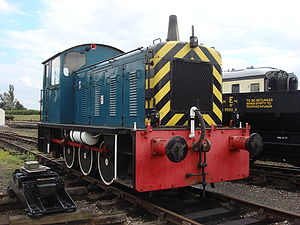British Rail Class 04

D2298, as preserved at the Buckinghamshire Railway Centre.
(NB - few examples were given any form of blue livery while in service with British Railways) |
|||||||||||||||||||||||||||||||||||
|
|||||||||||||||||||||||||||||||||||
|
|||||||||||||||||||||||||||||||||||
|
|||||||||||||||||||||||||||||||||||
|
|||||||||||||||||||||||||||||||||||
| Type and origin | |
|---|---|
| Power type | Diesel-mechanical |
| Builder | Drewry Car Co., at Vulcan Foundry and Robert Stephenson and Hawthorns |
| Build date | 1948 (D2341); 1952–1962 (D2200-2340) |
| Total produced | 142 |
| Specifications | |
|---|---|
| Configuration: |
|
| • Whyte | 0-6-0 |
| • UIC | C |
| Gauge | 4 ft 8 1⁄2 in (1,435 mm) standard gauge |
| Wheel diameter |
D2200–D2214: 3 ft 3 in (0.991 m) D2215–D2273: 3 ft 6 in (1.067 m) D2274–D2339: 3 ft 7 in (1.092 m) |
| Minimum curve | 2 chains (130 ft; 40 m) |
| Wheelbase | 9 ft 0 in (2.74 m) |
| Length | 26 ft 0 1⁄2 in (7.94 m) |
| Width | 8 ft 6 in (2.59 m) |
| Height | 12 ft 1 1⁄2 in (3.696 m) |
| Loco weight | 30.2 long tons (30.7 t; 33.8 short tons) to 32 long tons (32.5 t; 35.8 short tons) |
| Fuel capacity | 225 imp gal (1,020 l; 270 US gal) to 300 imp gal (1,400 l; 360 US gal) |
| Prime mover | Gardner 8L3 |
| Transmission | Wilson-Drewry 5 speed epicyclic gearbox |
| Train heating | None |
| Train brakes | Vacuum |
| Performance figures | |
|---|---|
| Maximum speed | 25 mph (40 km/h) to 27 mph (43 km/h) |
| Power output |
Engine: 204 hp (152 kW) At rail: 152 hp (113 kW) |
| Tractive effort |
Maximum: 16,850 lbf (75.0 kN) to 15,650 lbf (69.6 kN) |
| Brakeforce | 14 long tons-force (139.5 kN) |
| Career | |
|---|---|
| Operators | British Railways |
| Numbers | D2200–D2341 |
| Axle load class |
D2200–D2214: RA 1 D2215–D2340: RA 2 |
| Withdrawn | 1968-1971 |
| Disposition | 18 preserved, remainder scrapped |
The British Rail Class 04 was a 0-6-0 diesel-mechanical shunting locomotive class, built between 1952 and 1962 and was the basis for the later Class 03 built in the British Railways workshops. However, the first locomotive to be built to the design was actually DS1173, in 1948, which served as a departmental shunter at Hither Green depot, before being transferred to the capital stock list as D2341 in 1967. The Class 04 locomotives were supplied by the Drewry Car Co., which at the time (and for most of its existence) had no manufacturing capability. Drewry sub-contracted the construction work to two builders both of whom built other locomotives under the same arrangement. Early locomotives (including DS1173) were built by Vulcan Foundry and later examples were built by Robert Stephenson and Hawthorns.
A clear line of development can be seen in the Class 04s from the 0-4-0DM locomotives built by Andrew Barclay and Drewry/Vulcan Foundry in the early 1940s. The design continued to develop during the construction period, but this was generally confined to the size of the cab windows and the diameter of the wheels. Similar locomotives had been built before the first Class 04, and others were built for industrial use.
The first four of these locomotives (11100-3 later D2200-3) were fitted with side skirting and cowcatchers for use on the Wisbech and Upwell Tramway and on the Yarmouth Docks tramway system. (British law requires locomotives running on unfenced street trackage to be so protected for the protection of pedestrians). The next batch differed from the first in being fitted with conical exhaust stacks (instead of the plain exhaust pipe that was later added to the original exhaust "hole") and shaped cab front windows (instead of the rectangular windows of the first batch). However, at least two (11111/D2210 and 11113/D2212) were also fitted with cowcatchers, etc. for use on the Ipswich docks tramway system. (Note - from 11115/D2215 the small cab side window of the first two batches was replaced by a much larger window, the rear half of which slid open.)
...
Wikipedia
